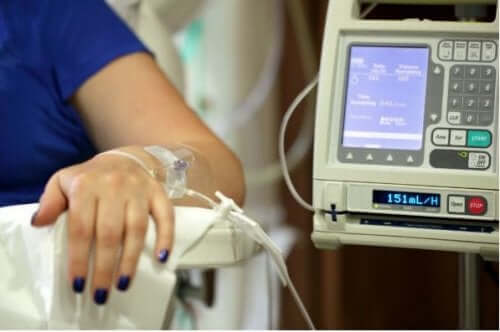Antiemetic Drugs to Prevent Nausea and Vomiting

Today, there are medicines, known as antiemetic drugs, that are effective in preventing nausea and vomiting of different origins. For example, it can help relieve the uncomfortable side effects of chemotherapy.
It’s important to differentiate both terms. Nausea is an unpleasant feeling in the throat and stomach that often precedes vomiting. It usually appears along with other symptoms such as paleness, sweating, and excessive salivation. And, in some cases, it may also involve a decrease in blood pressure and the number of heartbeats per minute.
After nausea, gagging occurs, which is the very effort of vomiting. These are strong contractions of the muscles of the abdominal wall. Their purpose is to create the pressure necessary to vomit.
Gagging can occur with vomiting, preceding it or following it. Finally, vomiting, clinically known as emesis, is the rapid and energetic emptying or expulsion of the gastric contents. Sometimes, it may involve the expulsion of intestinal content.
What are antiemetic drugs?

Antiemetic drugs help to prevent nausea and vomiting. They’re normally prescribed to treat motion sickness and the side effects of the following pharmacological groups:
- Opioid analgesics
- General anesthetics
- Chemotherapy as a treatment against cancer
There are four different groups of antiemetics depending on the mechanism of action they present. Thus, they’ll be effective in different situations, depending on the cause that’s triggering the nausea and vomiting.
In this sense, we’re going to look at the most common antiemetic drugs that help prevent nausea and vomiting of different origins.
Antiemetics to prevent nausea and vomiting
Antiemetics for pregnancy
Nausea and vomiting in pregnancy affect about 80% of women. These symptoms are generally mild and usually go away by the 20th week of pregnancy.
There’s very limited clinical evidence regarding the treatment of hyperemesis gravidarum. Furthermore, in most cases, studies have involved patients who have these symptoms in their mildest form.
In this regard, we have doxylamine, an antiemetic antagonist of histamine H1 receptors, marketed under the brand name Diclectin, among others.
As a second line, doctors usually administer metoclopramide, a dopamine antagonist. However, patients shouldn’t take this drug for more than 5 days, at a dose of 10 mg up to three times a day. Doctors may also prescribe ondansetron as a second line of defense. And, as a third option, they may prescribe methylprednisolone, adjusting the amount to the minimum effective dose.
Antiemetics for chemotherapy

Among the most common antiemetic drugs for these cases are the following:
- Corticosteroids: These have been used successfully for many years, especially to prevent delayed nausea and vomiting. An example of these drugs is dexamethasone, with many different forms of administration.
- Serotonin antagonists: These block the natural substances that send the signal to the brain that produces vomiting. They prevent both acute and delayed nausea and vomiting. Some of the most common are ondansetron, granisetron, and dolasetron.
- NK-1 inhibitors: These are the newest types of antiemetic. Aprepitant is used when patients receive chemotherapy that’s very likely to cause acute or delayed nausea and vomiting. Patients can take them before a chemotherapy session and for two days after.
Find out: What Are the Side Effects of Cancer Treatments?
Antiemetics for dizziness or motion sickness

The dizziness that appears during traveling is also called motion sickness. This is the appearance of nausea, vomiting, and symptoms that occur as the result of repeated linear and angular acceleration and deceleration.
To reduce the symptoms, experts recommend taking a drug that reduces dizziness. Thus, the recommendations are:
- For adults: 2 hours before the trip, take 30 mg of the antiemetic cinnarizine. You can repeat the dose every 8 hours. Patients can also take between 50 and 100 mg of dymenhydrates (Biodramine) every 6 or 8 hours.
- Children: It’s important to adjust the dose according to the label of each medicine. You shouldn’t administer tietilperazine to children.
Conclusions on how to prevent nausea and vomiting
Fortunately, we currently have a wide range of therapies available to prevent nausea and vomiting due to various causes. Consult your doctor or pharmacist if you have any questions about these medications. That way, you’ll be sure to carry out the treatment well and improve the therapeutic effectiveness that antiemetic drugs offer.
All cited sources were thoroughly reviewed by our team to ensure their quality, reliability, currency, and validity. The bibliography of this article was considered reliable and of academic or scientific accuracy.
- Madridejos Mora, R., & Hernández Corredoira, V. (2005). Antieméticos. FMC – Formación Médica Continuada En Atención Primaria. https://doi.org/10.1016/s1134-2072(05)71267-6
- Castro, M. C., Araújo, S. A. de, Mendes, T. R., Vilarinho, G. S., & Mendonça, M. A. O. (2014). Effectiveness of antiemetics in control of antineoplastic chemotherapy-induced emesis at home. Acta Paulista de Enfermagem. https://doi.org/10.1590/1982-0194201400069
- Bhardwaj, N., Bala, I., Kaur, C., & Chari, P. (2004). Comparison of Ondasetron with Ondansetron Plus Dexamethasone for Antiemetic Prophylaxis in Children Undergoing Strabismus Surgery. Journal of Pediatric Ophthalmology and Strabismus.
This text is provided for informational purposes only and does not replace consultation with a professional. If in doubt, consult your specialist.








